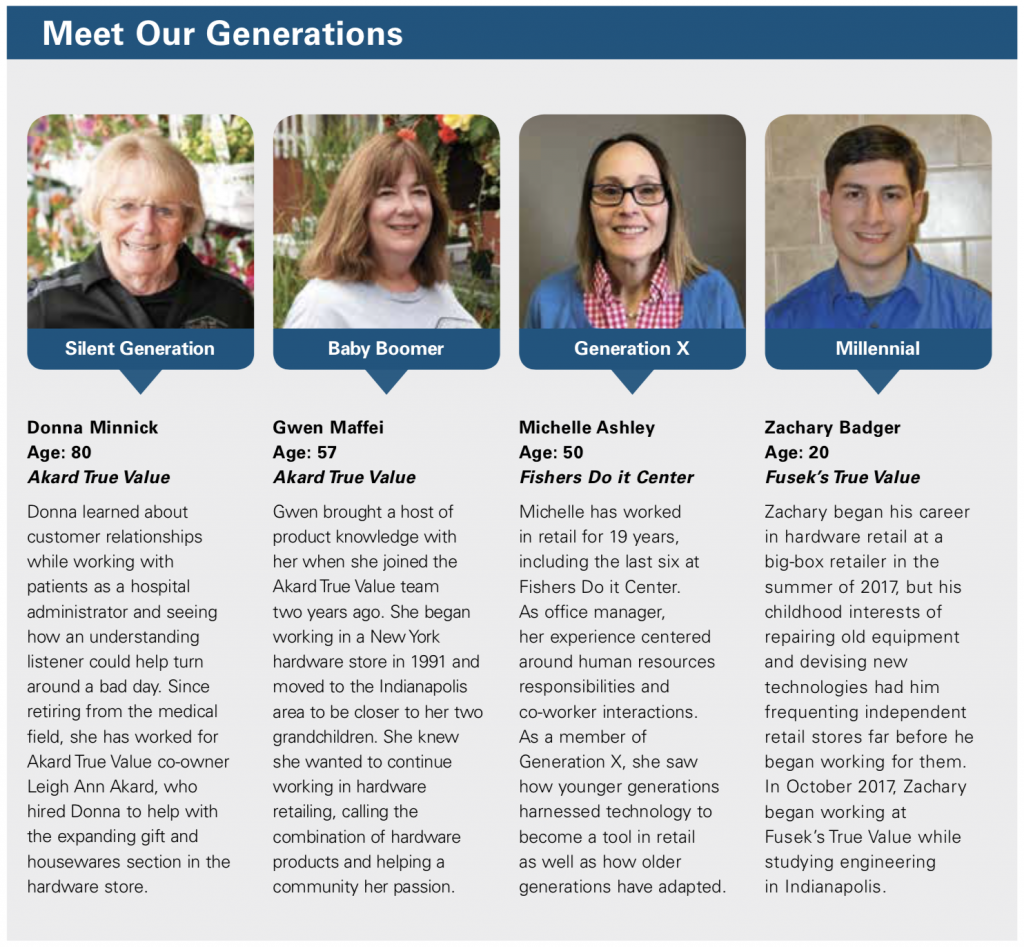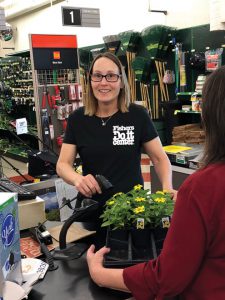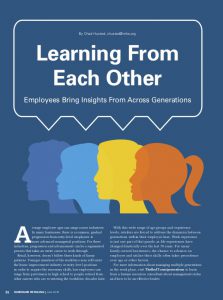Click the image about to download a PDF of the story.
Average employee ages can range across industries. In many businesses, there is a common, gradual progression from entry-level employees tomore advanced managerial positions. For these industries, progression and advancement can be a regimented process that takes an entire career to work through.
Retail, however, doesn’t follow these kinds of linear patterns. Younger members of the workforce may still enter the home improvement industry at entry-level positions in order to acquire the necessary skills, but employees can range from part-timers in high school to people retired from other careers who are re-entering the workforce decades later.
With this wide range of age groups and experience levels, retailers are forced to address the dynamics between generations within their employee base. Work experience is just one part of that puzzle, as life experiences have changed drastically over the last 70 years. For many family-owned businesses, the chance to advance an employee and utilize their skills often takes precedence over age or other factors.
For more information about managing multiple generations in the workplace, click here to learn from a human resources consultant about management styles and how to be an effective leader.
Hardware Retailing sat down with several employees to discuss how different generations in the current retail workforce have altered the retail landscape. Employees in the modern retail environment are in constant interaction throughout the day, and those interactions can shape how tasks are accomplished and whether the business thrives or struggles. Editors hosted a roundtable for employees to talk about their experiences as employees working with other generations.
The discussion centered on how different generations can work together in a retail environment and what complementary skills are associated with a diverse workforce.
According to the U.S. Census Bureau, baby boomers, who were born between 1946 and 1964, are the oldest generation still working full or part time in retail. However, some members of the silent generation, born between 1928 and 1945, are still in the workforce.
Generation X (1965-1980) is the next youngest, followed by millennials. Millennials (1981-2000) make up a growing portion of the workforce, with the generation overtaking baby boomers in 2015, according to the U.S. Census Bureau. This generation can include full-time professionals in their 30s to students and entry-level applicants in retail.
Representatives of these generations met for the Hardware Retailing roundtable and discussed a range of topics, and each brought a unique perspective based on how they have experienced the hardware industry.

What Attracts a Generation
A retail business should be a welcoming place for customers and employees alike. Workplace satisfaction has to be a common topic for anyone owning or managing a business, as employee morale and attitude will inevitably affect customer satisfaction and business efficiency positively or negatively.
So knowing how to attract and invigorate employees with wildly different backgrounds and motivators is key for any employer, particularly
a retailer. For Michelle Ashley, employee morale strongly affects her work as office manager at Fishers Do it Center in Fishers, Indiana. Ashley, 50, falls under Generation X and has worked with co-workers across many other generations while managing human resources responsibilities as well as salesfloor duties.
In Ashley’s experience, the youngest and oldest employees in a store are actually similar in their desires from a position within retail. Both often place flexible schedules at a premium, even if it is for different reasons, and like to be praised for a job well done. That need for acknowledgment shows itself in different ways, however.
“Young people do get their feelings hurt at times, which means you have to tone it down a bit when considering work reprimands and performance evaluations,” Ashley says. “Older workers want respect for their knowledge and abilities, so that can be tricky as well. The older generations hold a lot of the industry knowledge, but transferring that knowledge to other generations can be difficult sometimes.”
That knowledge is often one of the greatest assets of older generations. Not only do older employees carry life experiences with them that can prove useful for customers and co-workers, they have had more opportunities to experience the hardware industry and its many demands.
For Gwen Maffei, a baby boomer with 22 years in retail hardware, it was appreciation of that experience that drew her to Akard True Value in Zionsville, Indiana, when she moved into the area to be closer to family. Having worked for years in a small hardware store in New York, Maffei felt she could offer plenty of advice, assistance and cheer to offer customers and wanted to work with a group that felt the same way about customer service as she did.
“From the beginning, the people at Akard True Value showed me I was valued and my experience was needed in the store,” Maffei says.
“I enjoy helping customers, I enjoy using my time in the industry to help others solve their problems. If your experience is validated, even when you’re older than other employees and a new employee in the store, then it shows how much you’re valued as an employee and as a person.”
Zachary Badger, the youngest participant in the Hardware Retailing roundtable and a millennial, knows how much a flexible schedule can help in daily life. Badger works as a customer service rep at Fusek’s True Value in downtown Indianapolis while also pursuing a degree full time at a local university. As a busy college student, making sure he has the ability to complete his studies without affecting his time at work is of great concern for both himself and his employer.
“I’ve always been met with a great understanding of my role as a student. My managers have said, ‘We want school to be your focus, but while you’re here at the store, your focus needs to be here for that time,’”Badger says.“I respect that attitude, and I want my co-workers to have their focus at work as well. That’s how you get the best results.”

What Motivates a Generation
Motivation can be a moving target for retailers. Encouraging employees requires delving
into the personal ambitions and attitudes of individuals and finding the areas that can best move that person toward both their and the business’s goals. Different generations respond to motivational techniques in different ways, requiring a sometimes tailor-made program to push employees toward good work habits.
Donna Minnick, as part of the silent generation, represents a still-vital part of the retail hardware workforce. Employees who were born and lived through the turbulent 1940s are still looking to work and be valued in the public arena, Minnick says, especially in an area that allows them to interact with people from all generations.
A big motivator for Minnick is a desire to continue working in an environment that can accommodate the needs of older employees while utilizing their skills. Minnick, who has worked at Akard True Value for three years, has worked out a schedule that allows her to make doctor appointments and other standing obligations while still getting the positive boost she feels from contributing to the team environment in the store.
That team atmosphere is extended to working with younger employees, Minnick says. Often the youngest generation at Akard True Value is high school students working part time before moving on with their career plans or possibly enrolling in higher education. While these employees might not be interested in retail hardware as a career, their presence inspires Minnick, as do the stories she hears from young people who return years after they worked at the store in their teens.
“When you get a bit older, you seek ways to contribute to your community. For me that’s working and helping people in the store,”
Minnick says. “Then there’s added benefits, like when you hear stories from young families that have so many memories from years past spent at this store. The Akard family is very involved in helping the community through events like fundraisers and farmers markets, so to have a work family like the one we have here is very important for me.”
Badger feels his attitude toward motivation is an example of others in his situation and age bracket. He enjoys his work and taking on new tasks, and he isn’t afraid to show his lack of experience in a task by asking questions. He’s motivated by conquering those early failures and acknowledgement from those he looks up to.
He feels generational stereotypes can sometimes play a greater role in the evaluation of younger workers than the actual facts. Acknowledgement of an employee’s progress and proficiency should be noticed and commented on, he says. For example, he recently assembled and properly outfitted his first reset of power aisle displays and merchandising structures, a task which was thought to be beyond his experience level at the time. If his manager hadn’t taken the time to impress on him how much his work was appreciated, he would have been discouraged.
Badger sees his drive to take on new challenges as a benefit of working with people of his generation who are often not hindered by a fear of roadblocks or stumbles in the workplace.
“I’m not afraid to fail. I see the advantage of it, because it means I’m learning something,” Badger says. “I know my generation gets a bad rap. People think we’re lazy and we’re entitled. That motivates me to push back on those stereotypes, to be better than what others will assume when they see a young person in a job like ours. But if I show how wrong the stereotype is and it doesn’t change anything? It makes it harder to still hold that attitude.”
What Discourages a Generation
Motivation is a two-way street with traffic that never stops. On top of managing the constant fluctuations in employee moods and attitudes, retailers must also recognize that not every employee is in the same motivational lane.
The same actions that can set up one generation for success can stifle another or cause resentment among employees. One example that multiple roundtable participants cited as a difficult hole to thread was the possibility of mentorship and passing on skills from experienced employees to younger, less experienced co-workers.
In her role as office manager at Fishers Do it Center, Ashley has seen the positives and negatives associated with pairing off older employees with younger ones. If the fit is right, with an older employee eager to share their accumulation of skills with a receptive partner, it can be a match that will drive a store to new heights and serve as an example for other employees, she says.
However, not all employees are looking for this kind of relationship. Ashley has seen examples of older employees who have little patience for teaching, while Maffei will often see younger Akard True Value employees drift off as she is demonstrating skills like pipe fitting or tool selection to a customer. Both sides of this dynamic can have motivations that lean away from collaborating with co-workers, so retailers would do well to evaluate the attitudes of employees before instituting cooperative training programs like mentorships.

“A younger person is more likely to question the ‘why’ of situations or practices. For someone a bit older and experienced, that can come across as disrespectful,” Ashley says.
Maffei says she understands that not all younger employees are interested in a career in the hardware sector and therefore she doesn’t resent employees who don’t seek deeper product knowledge. However, something she will actively seek to correct is a mistake involving sales skills and customer service. Having experienced hands like baby boomers on staff can fill the product knowledge gaps, she says, but nothing can fix a store that has inattentive employees.
Badger’s experience at Fusek’s True Value has reflected that focus on customer service. As a younger employee, he’s been trained throughout his time in retail hardware on the importance of customer service in the independent sector, and based on that emphasis, he has made great efforts to succeed in that area.
Both younger and older generations have seen a lack of motivation for quality customer service inhibit an entire staff. If an age difference is involved, either with an older, more seasoned employee lacking motivation or a younger employee showing a disinterest in putting their best effort into customer interactions, it can exacerbate the issue.
“Big boxes have a lot of advantages over us, but they don’t have the employees that we do,” Maffei says. “That’s each generation, because I’ve seen customers enjoy interacting with young people while they’re shopping, and I’ve seen younger customers getting great lessons from experienced hands. If there’s any focus that every generation can be involved in, it’s how we value the customer and serve community members that seek out our help.”
 Hardware Retailing The Industry's Source for Insights and Information
Hardware Retailing The Industry's Source for Insights and Information









